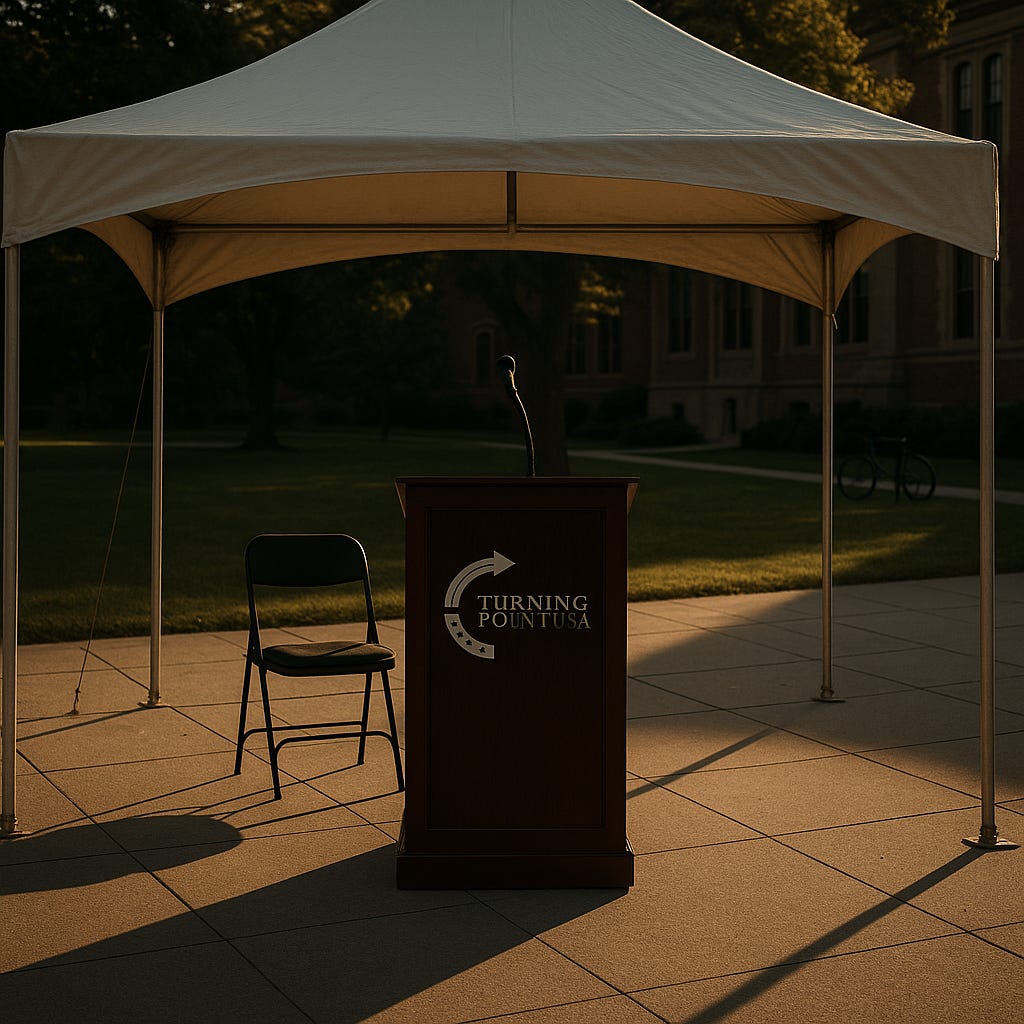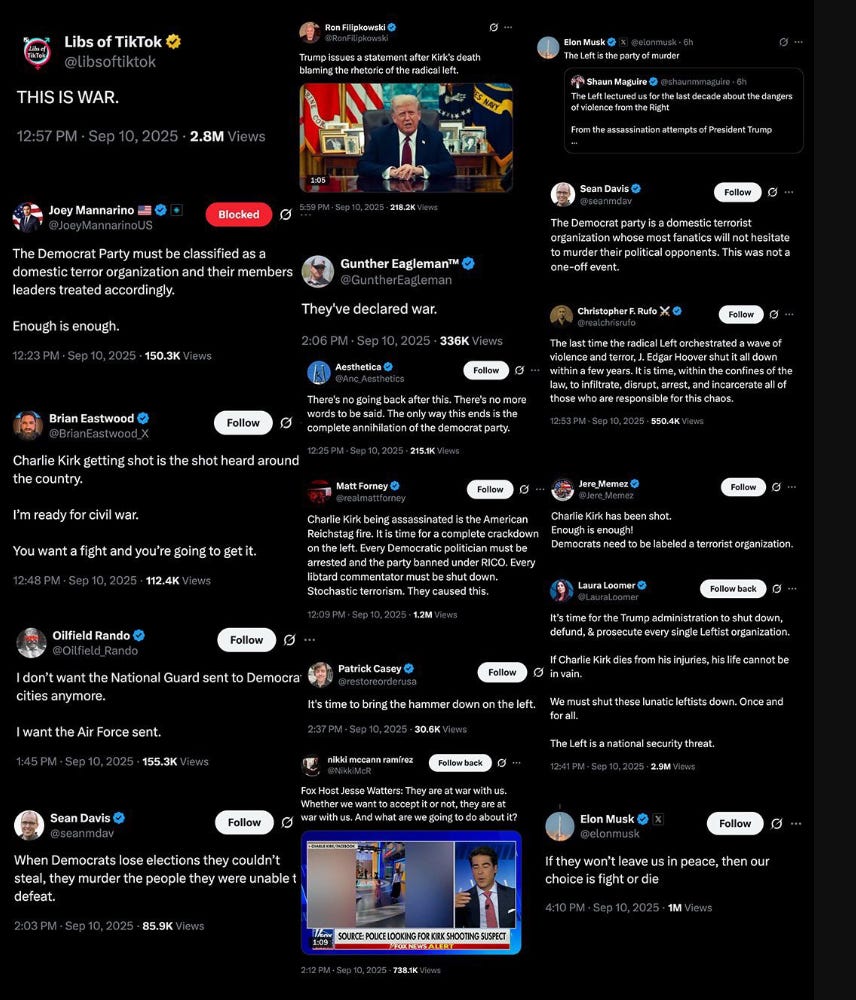The Enemy Within
How a Movement's Violent Rhetoric Created Its Own Assassin
Let’s talk about political assassinations for a second, because we’ve seen what happens when someone tries to change the direction of a country with a bullet in the past. When Abraham Lincoln was shot, the whole plan for healing after the Civil War collapsed. Reconstruction fell apart, and racism got a new lease on life for a hundred years. When Yitzhak Rabin was murdered in Israel by one of his own — not an enemy, but one of his own — the peace process went down with him. The lesson is always the same: when the violence comes from inside your own camp, it’s the hardest to recover from.
And then, of course, there’s JFK. The Kennedy assassination is basically America’s original trauma. It wasn’t just grief; it was confusion, suspicion, a wound that never closed. People stopped believing the official story. Conspiracy theories multiplied, and trust in government never really came back. That’s how powerful political assassination is — it doesn’t just kill a person, it can shake an entire country’s belief that the system even works.
And that’s the context for what just happened with Charlie Kirk. He wasn’t an elected politician, but let’s be real, he was a political leader. He mattered. He built Turning Point USA, which became the epicenter for conservative youth politics. He gave thousands of young people a sense of belonging, a kind of political home. He was a close Trump ally, a cultural warrior, someone who took that feeling of resentment and turned it into an identity. He didn’t write complicated policy papers. What he did was simpler, and honestly more effective: he repeated things, he sharpened them, he made them stick. He told people their fears were real, that their place in society was under threat, and he turned that into a movement.
Now, here’s the thing: to really understand why his assassination hit so hard, you’ve got to look at the environment around him. Because these moments don’t come out of nowhere. There’s a playbook that keeps getting run, and it always goes the same way.
Step one: you take your opponents and strip away their humanity. You don’t call them neighbours or fellow citizens anymore. You call them “socialists,” “traitors,” “enemies of the people.” Once you’ve slapped those labels on, it gets a lot easier to imagine them as less than human.
Step two: you crank up the crisis talk. Every election becomes the “most important in our lifetime.” Every issue is the end of the world. There’s no room for compromise because, hey, how do you compromise with evil? So the stakes keep getting higher, until it feels like everything is do-or-die.
Step three: you arm the identity. You take political belonging and fuse it with guns. Owning one isn’t just a right anymore, it’s a duty. You make people believe that democracy isn’t about persuasion, it’s about being ready to defend your side with force if it comes to that.
And when you put all that together, you don’t just have a debate anymore. You’ve got a permission slip for violence. You’ve got people believing they’re not voters, they’re soldiers in a war. And if you really believe you’re in a war, well… what tools are off-limits?
That’s the ecosystem Charlie Kirk operated in. And when he was killed, it shocked his followers, but it also turned him into something else entirely: a martyr. And here’s the dark truth — assassination always does that. It takes someone who was complicated, controversial, sometimes divisive, and it erases all that messiness. Suddenly, the story is simple: they died for the cause. Their voice becomes holy, their politics untouchable. Criticism goes quiet. Debate stops. And the movement hardens around their memory.
So let’s talk about what happened next. Because the reactions to Kirk’s assassination say just as much about the state of American democracy as the act itself.
Donald Trump didn’t pause to unify the country, or to cool things down, or even to mourn in a way that pulled people together. No. He did what he always does: he spun the tragedy into his own story. Within hours, he was blaming “radical Democrats.”
He was painting the left as violent, dangerous, illegitimate — as if the entire assassination was just more proof of what he’s been saying all along. It wasn’t reflection; it was reflex. He saw a chance to weaponise the moment, and he grabbed it.
But here’s the uncomfortable truth. When the shooter’s identity came out, it blew that narrative apart. The killer wasn’t a Democrat. Not transgender. Not queer. Not Black. Not Muslim. Not an immigrant. Not Antifa. He was white. He was Christian. Conservative. Republican. Male. Straight. A gun enthusiast. He looked exactly like the base Kirk and Trump had been championing.
And that’s the most terrifying part. Because this wasn’t violence coming from the outside. It wasn’t “the enemy.” It was homegrown. It was the movement’s own rhetoric, pushed to its breaking point. There’s a name for that: stochastic terrorism. It’s when leaders keep pumping out messages that paint whole groups of people as enemies, as threats, as monsters. They don’t pull the trigger themselves. But they don’t have to. By repeating the message often enough, loudly enough, they create the conditions where some lone individual — already angry, already unstable — decides to act. And then the leaders can step back and say, “Well, I didn’t tell him to do that.” But come on. The line from word to action isn’t invisible. It’s right there.
Calling these shooters “lone wolves” is wrong and dangerous. Wolves don’t exist without a pack. They’re part of an ecosystem. And in this case, the ecosystem is built out of grievance, paranoia, and endless calls to see politics not as democracy but as war.
Now, here’s where institutions are supposed to step in. You’d expect leaders on both sides, religious voices, respected figures in the media, to slam the brakes. To say: enough. Violence has no place here. But that didn’t happen. The administration tried to calm tensions, sure, but even their statements were laced with politics. Calls for unity on one hand, but calculations about how this could play in the next election on the other. What should have been a moment of moral clarity turned into another round of partisan sparring. And the deeper problem? The referees — the people who used to hold the line, who could speak to everyone — have all chosen sides. The pastors, the anchors, the statesmen, the journalists. They’ve put on team colours. So now, when the fight gets bloody, there’s nobody left to blow the whistle.
And what filled the vacuum? Martyrdom. Kirk, in death, became more powerful than he ever was in life. His supporters sanctified him. The complexities of his politics disappeared, and what remained was the story of a man who “gave everything for the cause.” That’s how martyrdom works. It doesn’t soften a movement; it hardens it. Criticism becomes taboo. Compromise becomes betrayal. The memory of the dead becomes the justification for more radical steps.
That’s the danger staring America in the face right now. Kirk’s assassination isn’t cooling things down. It’s heating them up. It’s turning grievance into fuel, pouring petrol on the fire. And once a movement builds itself around grievance and martyrdom, it becomes nearly impossible to shift.
Now, is America unique here? Yes and no. Political violence happens all over the world. But America has its own recipe — and it’s a toxic one. The divisions are baked deep into the founding: federal versus state power, the legacies of slavery and race, the frontier myth that says the gun is the final guarantor of freedom. Other democracies have free speech, but few have such a wild, fragmented media ecosystem where outrage is profitable. In Europe, hate speech laws at least try to put boundaries around incitement. In the US, the loudest, angriest voices get rewarded with clicks, cash, and airtime. Put it all together and you get a society where escalation is built into the system. Kirk’s assassination wasn’t imported from somewhere else. It was made in America.
So where do we go from here? If democracy is fragile, it’s not fragile by accident. It’s fragile because of choices. Which means it can also be repaired by choices. But those choices are hard. They require courage. And they have to start on the inside. Conservatives — especially the ones with credibility inside the movement — need to stand up and say: violence is not the answer. Not in words, not in suggestion, not in jokes at a rally. They need to cut off the oxygen to those who keep playing with fire, even if those people draw big crowds.
We also need to rediscover compromise. Yeah, I know, compromise is boring. It’s not a rallying cry. But compromise is the operating system of democracy. It’s the thing that lets a country with hundreds of millions of people, all with different beliefs, actually function. Without it, the system jams.
And beyond politics, communities matter. Local news, civic groups, neighbourhood ties — the places where people still see each other as human beings, not as avatars of a political tribe. We need more of that. We need kids learning not just how to read and write, but how to sort fact from fiction, how to recognise when they’re being manipulated by outrage media. Media literacy should be as basic as maths.
And one more thing: we’ve got to resist the temptation of martyrdom. People are complicated. Kirk was complicated. His politics were controversial and often corrosive. He wasn’t a saint. If we let every assassination turn the victim into a flawless symbol, then we stop being able to talk honestly about what they stood for. And when we stop talking honestly, we give movements permission to radicalise further in their name.
Charlie Kirk’s assassination is a tragedy. For his family. For his supporters. For the country. But if America lets this moment become an excuse for more division, more scapegoating, more fear, then the assassin’s bullet will have done far more damage than one killing. It will have told the world that democracy here is too weak to withstand violence. That we’d rather fight each other than defend the rules we all live by.
And that’s the choice right now. Does the ballot survive, or does the bullet win? Because if the bullet wins, the future of American democracy looks a lot darker than its past.




